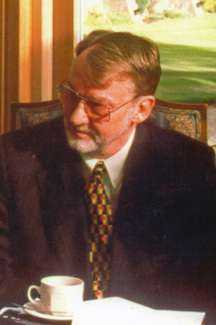
Colin Dennard, 73, the leaseholder who would not give up. He thought there was something wrong with Benjamin Mire holding judicial office, and he was proved right. Now the ombudsman has said he was a victim of maladministration by the judicial authorities
Judge Siobhan McGrath has apologised to the pensioner whose complaints led to Benjamin Mire losing his judicial appointment.
The apology to Colin Dennard, 73, of Ferndown in Dorset, is an acknowledgement that the Residential Property Tribunal Service (RPTS), of which McGrath was the Senior President, bungled the issue. (She is now president of the new Property Chamber).
The RPTS “misapplied the rules on the handling of complaints” which delayed the investigation into Mire.
A chartered surveyor and CEO of Trust Property Management, based in Colindale, north London, Mire was also a part-time chairman of the Leasehold Valuation Tribunal.
Dennard did not feel he should have been appointed, and last year the Lord Chancellor and the Lord Chief Justice agreed with him: Mr Mire had “failed to observe the standards that could reasonably be expected of a judicial office holder and that this failing was sufficiently serious to justify his removal from office”.
McGrath adds in her apology to Mr Dennard:
“I apologise that this delay occurred and accept that it ought not to have happened. The procedure to be followed in dealing with complaints is now clarified and a similar situation should not occur again.
“I am very sorry if you have suffered any inconvenience or distress as a result of the error.”
The apology is a vindication of Mr Dennard’s dogged persistence in having his complaint taken seriously by the judicial authorities.
The issue has at times come close to overwhelming Mr Dennard, who suffers from serious ill-health being frequently hospitalised and semi-bedridden.
“The appointment of Mire to be a chairman of a tribunal where he so regularly appeared defending indefensible practices in leasehold offended every notion of justice I have ever known,” said Mr Dennard, a former vice-president of the Hotel Meurice in Paris and the Carlton in Cannes.
“What was obvious to me should have been obvious to those occupying the highest positions in the RPTS: Mire should never have been appointed as a tribunal chairman, or should have been dropped years ago.”
Judge McGrath’s apology is far from being the result of a spontaneous change of heart.
It is prompted by a report last week by Sir John Brigstocke, the Judicial Appointments and Conduct Ombudsman, who upheld Mr Dennard’s complaints that both the RPTS and the JCIO had let him down.
“I recommend that the head of the JCIO and the senior president [McGrath] write to Mr Dennard to apologise for the failings that have been identified in my report,” Sir John writes.
The ombudsman upheld the bulk of Mr Dennard’s complaints and that “the failings I have identified amount to maladministration in the round”.
He added:
“These failings include: the RPTS’ misapplication of the rules, a breakdown in communications between the RPTS and the JCIO concerning the investigation of the complaints made against Mr Mire; the JCIO’s lack of investigation and delay in investigating the complaint; the JCIO’s failure to keep Mr Dennard sufficiently updated on progress; and the JCIO’s unsatisfactory final correspondence to Mr Dennard, including the fact that at no point was he informed that the Review Body had not considered his complaint against Mr Mire.”
But:
“I have not upheld Mr Dennard’s concerns that the Senior President [McGrath] failed to instigate an investigation into Mr Mire’s appointment or into the allegations of a conflict of interest and lack of impartiality arising from Mr Mire’s appointment.”
Sir John Brigstocke’s full report is below.
Delay and incoherence characterised the judicial bureaucracy’s handling of the case.
There were complications: Mr Dennard withdrew a first complaint against Mr Mire in April 2010 as a condition of settling a dispute. Then he made another in 2012, only to discover that the first one had, in fact, been passed to the silent JCIO.
A “breakdown in communications between the RTPS and the JCIO concerning the investigation of the complaints made against Mr Mire certainly contributed to the overall delay in the matter.”
And the RTPS would do nothing on its own initiative.
Sir John writes:
“I can see why the Acting President of the Southern RTPS [to whom the issue was referred] considered handing the whole matter to the JCIO. It involved a serious issue that meant that Mr Mire was liable to be removed from office, and a similar matter had been dealt with in this manner.
“However, this did not absolve him from at least conducting an initial investigation and obtaining Mr Mire’s comments.”
When the property tribunal service passed the complaints to the JCIO it emerged that there were 11 complainants in the Mire inquiry. It created a review body to hear the case from October 2012.

Siobhan McGrath, for 13 years senior president of the Residential Property Tribunal Service and now president of the new Property Tribunal
Three meetings were held and Mr Mire gave oral evidence.
In May 2013 the review body recommended that Mr Mire be removed from his judicial appointment, but he resigned on July 16.
None of this was made public. The frustrations of Mr Dennard at this time were palpable, nor could LKP obtain a comprehensible statement on what was happening from the JCIO.
After three and a half years, Mr Dennard finally got the public statement that he had waited for on November 15 2013 when the Lord Chancellor and the Lord Chief Justice stated that Mr Mire’s conduct was “sufficiently serious to justify his removal from office”.
It is a depressing side-issue of this case, that the crucial public statement was made after Sir Peter Bottomley raised the Mire issue in parliamentary questions.
The JCIO has undertaken to improve complaints procedures and will rule on cases even where there is a resignation.
In his report, Sir John Brigstocke repeats for a second time that he did not uphold “Mr Dennard’s concerns that the senior president failed to instigate an investigation into Mr Mire’s appointment or into the allegations of a conflict of interest and lack of impartiality arising from Mr Mire’s appointment”.
COMMENT
All leaseholders should applaud the determination of Colin Dennard to push this issue to an outcome in the face of complacent and uninterested judicial authorities.
It is, in fact, a public humiliation for all involved.
An ordinary leaseholder felt that something was not right about the suitability of Mr Mire to hold a judicial appointment, and that was found to be correct.
The RPTS, headed by Siobhan McGrath, had years to address this issue. It did not even consider “conducting an initial investigation and obtaining Mr Mire’s comments”, according to the ombudsman.
It limited itself to passing everything on to the JCIO.
The delays and ineptitude of that office are made clear in Sir John Brigstocke’s report.
LKP had direct experience of the incomprehensible statements on the Mire case from the JCIO. It is to be hoped that that organisation now makes its review body’s rulings public and open as a matter of course.
The wheels of the judicial bureaucracy should not have been so rusty. A complainant less determined than Colin Dennard would have given up years ago. He was, indeed, a victim of maladministration.
It required a considerable degree of push – with Sir Peter Bottomley firing off parliamentary questions and using his weight behind the scenes – finally to lay this matter to rest.
Why?
Sir John Brigstocke’s ruling can be read here. (A leaseholder’s name has been redacted by LKP at her request)
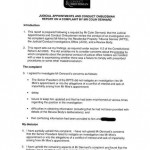

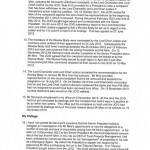
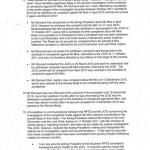

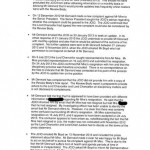
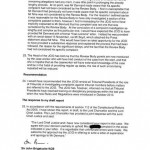

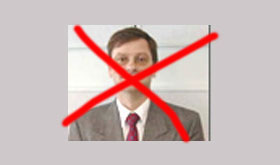




















Brilliant work, Colin.
Well done , Colin , for pushing your complaint to victory.
Judge McGrath should follow up by making a formal complaint to RICS and ask for Mr Mire to be struck off for unprofessional conduct.